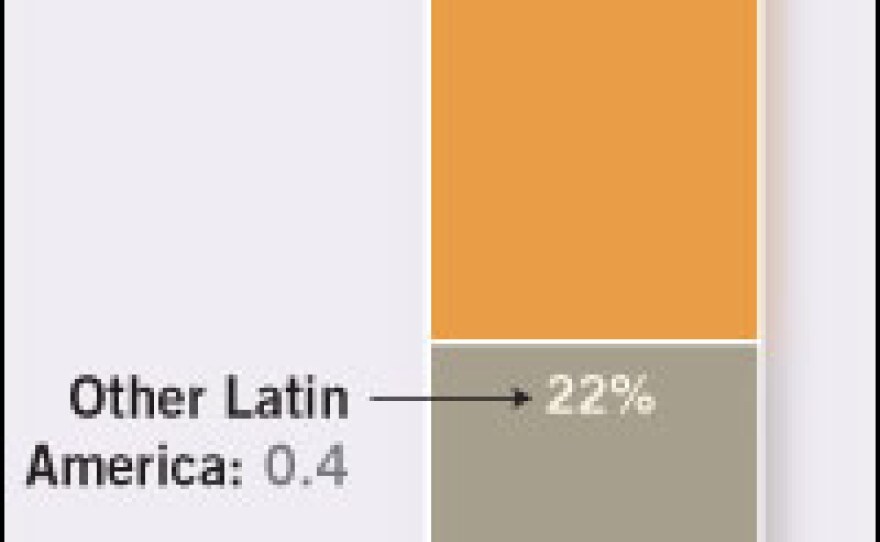
The White House and a bipartisan group of senators have reached a deal on a sweeping bill that moves Congress closer to passing a long-debated overhaul of immigration policy. But critics on both sides say they find parts of the bill unworkable and troubling.
The measure promises to step up enforcement at the border and in workplaces, while also giving some 12 million undocumented foreign workers a path to permanent legal status in the United States.
Just last week, immigrant advocate Frank Sharry of the National Immigration Forum was betting that deep divisions in this emotional debate would prevent any deal.
Now he calls the Senate bill an "excellent start."
"What's remarkable about the deal is who is a party to it," Sharry said, noting in particular conservative Republican Sen. Jon Kyl of Arizona, a conservative Republican and the liberal "lion" of the chamber, Sen. Ted Kennedy of Massachusetts.
"And look, they both had to make concessions," Sharry said.
Kennedy, the main Democratic sponsor, says the bill is not ideal, but said he feels that what it accomplishes for undocumented workers is "breathtaking."
The illegal workers would have to pay a $5,000 fine, return to their home country to apply for a visa, and wait eight to 13 years to gain permanent status. But Kennedy said it also would mean that immigrant parents would no longer live in paranoia about being arrested and sent away from children who are U.S. citizens by birthright.
"They're living in fear, and they continue to work," Kennedy said of those parents. "But they know that tonight they go to bed and they're safe and secure and they know that their children are safe and secure."
But immigrant advocates say a major and controversial break from longtime policy would hurt families. The Senate bill would make it harder to bring in relatives — parents, siblings and adult children, for instance.
Instead, a new points system would favor applicants with things like higher education, and fluency in English. Sen. Lindsey Graham, a Republican from South Carolina, called the change overdue.
"America needs an immigration system that can compete for the best minds in the world," Graham said. "The new system will do it better than the old system."
Another issue for both sides is a temporary-worker program. The bill would admit some 400,000 foreigners a year. They could only work a total of six years, in periods of two years at a time, with long breaks in between. What's more, they could not bring their families with them.
Sonya Ramirez of the AFL-CIO says that would just foster the same illegal migration that's a problem now. And she says that would be bad for U.S. workers.
"It would create a secondary class of workers that essentially would be willing to work at lower wages, with less protections, and would still continue to live in the shadows of society," Ramirez predicted.
Business groups also have concerns. Randel Johnson of the Chamber of Commerce says a lot of his clients are wary of the mandated computer program to check new hires' legal status.
He has questions: Who will pay for the new employer verification system? Will there be checks on the system to make sure it is working properly? Are there provisions that will prevent employers from being sued if the system malfunctions?
Lawmakers took pains to insist that the bill does not represent "amnesty" for illegal immigrants. But many who want to restrict immigration are not convinced.
"This is just a replay of the same bait-and-switch that we saw in the 1986 amnesty more than 20 years ago," said Mark Krikorian of the Center for Immigration Studies.
He noted that the bill doesn't give immigrants legal status until after certain enforcement measures are in place. But it's left to the administration to decide when the proper enforcement measures are in place. Krikorian doesn't trust that arrangement.
"Everything we know about how immigration and politics works tells us that at the end of the day, the illegals will all get their legal status and all the other promises will be abandoned," Krikorian said. "You can have my car if it turns out differently."
The bill goes before the full Senate for debate Monday. Among those pushing for its passage will be President Bush. He's called for an overhaul of immigration policy since taking office, and would be able to count it as one bipartisan success of his administration.
Copyright 2022 NPR. To see more, visit https://www.npr.org. 9(MDAzMjM2NDYzMDEyMzc1Njk5NjAxNzY3OQ001))







